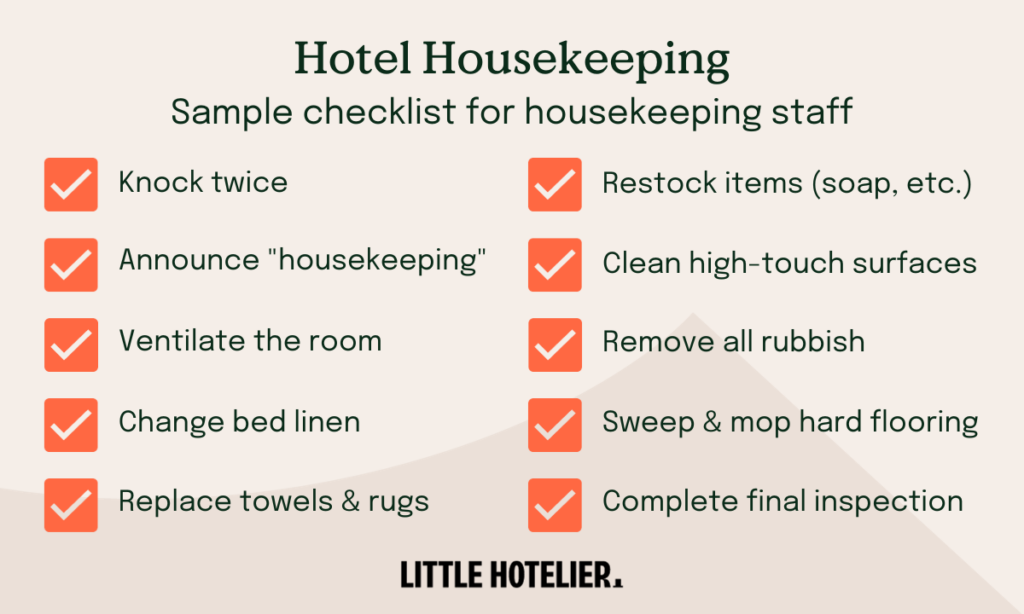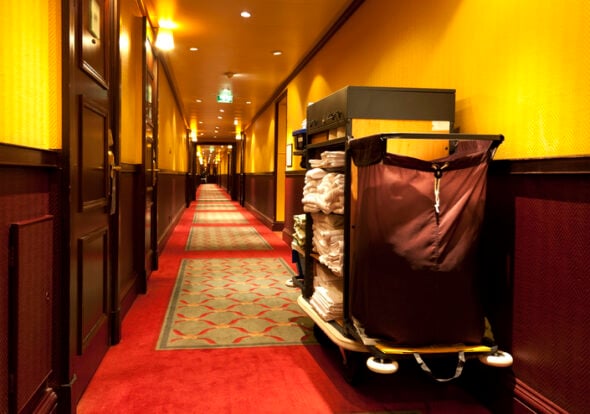What is hotel housekeeping?
Hotel housekeeping is about presenting a clean, sanitary, and welcoming environment at your hotel, putting your brand’s best foot forward at all times. Nevermind fancy amenities or attractions, you need to ensure your guests feel comfortable first and foremost.
Housekeeping in a hotel essentially comes down to being an invisible task. If a guest never raises a complaint about the condition of their room or their service, then you’ve got your housekeeping right. In a way, housekeeping is about making a guest feel like they’re checking into a room that’s being stayed in for the very first time – it’s ‘their’ room.
This doesn’t just happen – it takes strategy, planning, great execution, and communication. You can’t afford for rooms not to be ready in time, to be under-prepared, or overlooked by mistake.
Housekeeping and other tasks made easier
Want to streamline your day-to-day processes? Explore how an all-in-one management system can improve the efficiency of hotel operations.
Learn moreWhy is hotel housekeeping important?
Hotel housekeeping is important because it can make or break your hotel brand and reputation, eventually your occupancy and revenue.
We’ve all stayed in accommodation where the room… was left in a less than desirable state. Knowing the dissatisfaction of staying in a room that isn’t clean, the condition of your property should be one of your top priorities if you want to experience long term success. In fact, more than 85% of guests cite cleanliness as their main focus when reading reviews.
Slipping up in this respect can pose a real threat to your business. That’s why this blog will try to make sure you have all bases covered. Let’s explore everything you need to know about mastering your housekeeping.
Housekeeping duties and responsibilities
The main responsibility of anyone performing housekeeping duties is to ensure there is no evidence of previous guests, and that every room is completely clean from top to bottom. This includes the room itself, the bathroom, and any wardrobe or storage areas.
Daily housekeeping tasks typically include:
- Cleaning guest rooms of dirt, dust, marks, stains, smells etc
- Cleaning and sanitising bathrooms
- Removing rubbish and debris from rooms
- Removing dirty towels and linen
- Removing used amenities
- Replenishing supplies such as rubbish bags, bar fridge, snacks
- Making beds, replacing linen and towels
- Cleaning and tidying common areas such as hallways or entrances
- Ensuring all extras and add-ons that were included in the booking are ready for the arriving guests
A general routine is to strip the room first, removing anything that is dirty or has been used. No one wants to check-in to a room that has a wet bath towel hanging on the rack!
Next, you should do an inventory check to ensure all items that need replacing are gathered before the next guest arrives. Commonly, you’ll need to replace all the free goodies you have provided in the room as well as towels and linen.
After this you should be ready to clean. Ensure you have all your supplies readied and bring everything into the room together. This will save plenty of time.
Once the room has been thoroughly cleaned, put all the new items into place. Do a final check to make sure the arriving guest has everything they need and was promised upon their booking.
What should be included in a hotel room cleaning checklist?
A hotel room cleaning checklist should cover basics like changing linen and towels, making the bed, dusting, vacuuming, emptying bins and sanitising surfaces. A particular focus should be placed on the bathroom (toilets, showers, sinks), high-touch areas (switches, remotes, handles), high use areas (benches, bedside tables) and noticeable areas (mirrors, windows, high gloss surfaces). The checklist should also include restocking of toiletries and in-room amenities like tea, coffee and stationery, and doing whatever needs to be done to leave the room guest-ready.
The importance of a hotel housekeeping checklist
- 85% of travellers consider cleanliness the most important topic when reading reviews.
- Guests expect more than just tidy bedding; they demand streak-free mirrors, spotless bathrooms and no carpet stains.
- Easily overlooked checklist items include cleaning the TV remote, wiping down light switches, polishing glasses and conducting an odour check.
For small, independent hoteliers, a clear and consistent cleaning process ensures you deliver the same high standards across every room. A well-structured checklist protects your reputation and ensures every guest has a positive experience. It streamlines your operations, removes any cleaning guesswork, and makes it far easier to onboard new cleaners.
With all that in mind, here’s an example of a practical hotel room cleaning checklist you can adapt for your own property:
Knock twice: Ensure guests have checked out by knocking once, waiting a moment for an answer, then knocking again.
Announce “housekeeping!”: People who are hard of hearing, or who are in the bathroom or another room, may not answer your knocks. When you open the door, loudly say “housekeeping” to alert them to your presence.
Ventilate the room: Hotel rooms can get stuffy, so let fresh air in by opening the windows and leaving the front door ajar while you clean. If it’s a nice day and new guests are due, you can also leave the windows slightly open when you leave.
Change bed linen: Switch out all used bed linen (including the comforter/duvet cover) for freshly laundered items.
Replace towels and rugs: Switch out any other laundered items, such as bath towels, hand towels, face washers/flannels, bath mats and tea towels/dish towels.
Restock items: Replace any used or opened bathroom items (soaps, toiletries, toilet paper), refill complementary kitchenette items (tea, coffee, sugar, milk, snacks), and restock any used items from the minibar, noting what has been taken.
Clean surfaces: Dust and wipe down all surfaces, taking care with high touch and high use areas, and transparent, glossy or mirrored surfaces that can get noticeably dirty.
Remove all rubbish: Take out the trash, separating landfill/recyclables/organics where necessary, and put in new bin liners.
Vacuum, mop and sweep: Clean the flooring by vacuuming the entire room and mopping the bathroom and any other hard surfaces. Sweep any balconies or outdoor areas as necessary.
Complete the final inspection: Make the room guest-ready, and ensure a great first impression, by adding the difference-making touches like a welcome note, a small gift or an eye-catching towel sculpture. Review the checklist to ensure every box is ticked.

What are some housekeeping tips and tricks?
There are a number of housekeeping tips and tricks that can save you time and money while enhancing the experience you offer guests. These include protecting high-use items, instilling a sense of pride in your housekeeping team, and cleaning rooms in the most efficient order possible.
You should know exactly how long it takes to completely turn a room over, to calculate how much time and people should be dedicated to housekeeping. You can then set up an effective routine and schedule according to guest check-in/check-out times.
Here are some more general tips and tricks for effective housekeeping:
- Treat the job as if the guest is visiting your actual home (in some cases they probably are) – having a sense of pride will ensure you or your staff do the best job possible
- Clean bedroom areas before bathrooms areas to improve overall sanitation
- Use mattress and/or pillow protectors to prevent costly and time consuming damages
- Keep up with training and regulations – OH&S is crucial and so is keeping up to professional standards, especially in COVID times
- Regularly assess processes and time management to maintain a high degree of excellence
Pay close attention to inventory management too – Are there ways you can save time or money when it comes to room supplies? For example, reducing the selection of snacks if most guests seem to prefer particular options over others.
Most of all your housekeeping should be governed by three principles: prioritisation, preparation, and sustainability.
What are some hotel tips for cleaning, using equipment, and sourcing supplies?
It’s critical that your housekeeping team is equipped with the right tools and supplies. A quality clean demands quality equipment, so you should only invest in the best.
Here are some more room cleaning tips you may find useful:
- Carefully choose the best cleaning products for your situation. Don’t just consider price; factors like cleaning performance and fragrance are critical too.
- Choose tools and appliances – vacuums, brooms, dusters, scrubbers, polishers, the equipment trolley – that are built to last under sustained use.
- Invest in deodorisers and air fresheners to keep your rooms fresh, and to brand your hotel with a signature scent.
- Let nature help you – open windows and doors before or even during your clean to bring fresh air into the room, removing odours and stopping the smell of chemicals from lingering
- Don’t forget to vacuum the furniture too!
- Never skip hard-to-reach areas – it doesn’t take long for dust to build up or mould to take hold
- Sanitise all areas, especially items such as phones or remotes that are touched the most
- Hard floor areas need two cleans – sweeping and mopping
- Pay special attention to kitchen and bathroom drains, as well as fittings
- Always check areas in the bathroom that are not immediately visible – stains and scum don’t take long to spread in wet areas
- Always dust and clean light fixtures
And never forget to remove all your supplies from the room when you’re done. Guests might raise an eyebrow when finding the room extras include mould killer.
Take precious time back in your busy day
See how you can easily manage housekeeping tasks, view each room status, track schedule progress, and improve guest experience.
Watch a quick demoWhat are some best practices for hotel housekeeping?
Best practices for hotel housekeeping include forming a housekeeping checklist, working within check-out and check-in times, and treating guests as if they were visitors to your own home.
There have been housekeepers as long as there have been hotels. Over years of trial and error, a range of best practices have been established to help properties clean their rooms better, faster, and in a way that enhances the guest experience.
A few of these best practices include:
- Make your housekeeping ‘invisible’ to the guest by working within the hours between check-out and check-in
- Housekeeping needs to present a clean, sanitary, and welcoming environment
- A general routine is to strip the room, clean the room, replace supplies, and ready it for the next guest
- Treat the job as if the guest is visiting your actual home
- Your housekeeping should be governed by three principles: prioritisation, preparation, and sustainability
- Pay close attention to inventory management
- Research and test different products to get it perfect
- It helps to implement housekeeping software that has the ability to lighten the load with built-in automation
- The ‘best’ tech products on the market make it fast, simple, and affordable
What is the best housekeeping and scheduling software for hotels?
The best housekeeping and scheduling tools tend to streamline task management, improve communication between departments, and provide real-time updates on room status. Look for features like mobile access for staff, automated scheduling, customisable checklists, and integration with your property management system. The right tool should reduce errors, save time and ensure rooms are guest-ready more efficiently.
Since the constant juggling of numerous tasks can easily overwhelm, it helps to implement a housekeeping solution that has the ability to lighten the load with built-in automation. Being able to forecast factors such as the number of incoming guests or how many staff members are needed for a specific shift, can prove vital in maintaining quality of service.
Choosing to adopt hotel housekeeping software for your small property is a positive business choice, given half of all negative feedback received by hotels is attributed to the readiness and cleanliness of rooms. It’s also been found that 80% of guests would rather give up the internet for the duration of their trip than stay in a dirty hotel.
The ‘best’ tech products on the market make it fast, simple, and affordable. You want software that prioritises ease of use, the ability to be intuitive, and is able to perform many tasks autonomously.
If you’re already using any or all of a property management system, booking engine, channel manager, payments solution, and now housekeeping software the last thing you want to do is operate these independent of each other. You’d end up spending all your time jumping from dashboard to dashboard to update data. The process would be just as clunky and time-consuming as when you were still using pen and paper or excel spreadsheets to run your business
By Dean Elphick
Dean is the Senior Content Marketing Specialist of Little Hotelier, the all-in-one software solution purpose-built to make the lives of small accommodation providers easier. Dean has made writing and creating content his passion for the entirety of his professional life, which includes more than six years at Little Hotelier. Through content, Dean aims to provide education, inspiration, assistance, and, ultimately, value for small accommodation businesses looking to improve the way they run their operations (and live their life).
Table of contents
“Working with Little Hotelier has been the solution to our many problems, we've immediately modernized our administration, especially in customer service”
Owner, Hotel Santa Maria








